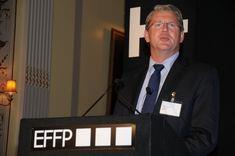
National Farmers’ Union (NFU) president Peter Kendall has called for a more global outlook in the food security debate, suggesting “some civil servants just do not try hard enough”.
Speaking at the Westminster Food and Nutrition Forum Seminar on Thursday on 21st century farming in the UK, Kendall suggested the UK needed to drive the debate worldwide, suggesting the UK is considerably further developed in its arguments than some other nations.
Charged with examining the contribution that UK farmers can make in feeding a burgeoning world population while at the same time impacting less on the environment, Kendall said factors such as volatile markets for oil and gas and pressure on producers from supermarkets could be key in impeding increased food production.
Kendall told an audience composed of food and drink industry experts, government representatives and primary producers that the UK was leading the way on the debate: “To DEFRA’s credit it has been at the forefront of the food security debate and they have said we are lucky to have relatively high food security, but people are getting confused - food security does not equate to self-sufficiency.
“Domestic food security is linked to global food security - it is not what the rest of the world can do for us, but vice versa. The UK food industry can play a driving role. We are well placed to be in the position to play a crucial role for the UK and abroad. The UK government has a moral duty to help and we believe some civil servants do not try hard enough.
“Our potential for growing different types of food, coupled with increased demand for our produce, should see a positive impact on prices and with it increased profits and stimulus for the reinvestment that is so desperately needed in some sectors.
“I have seen reports that say we need to increase production in extreme circumstances, but we want DEFRA to put production agriculture on the same level as the environmental demands it has been pushing.”
Kendall added: “Farmers and growers are also key players in the green energy revolution, with their farmland acting as a platform for renewable energy, both for growing sustainable fuel crops and turning farm waste into electricity. Many of the changes being made in the industry to increase productivity and competitiveness, as well as making good business sense, are also beneficial to the environment.
“I cannot help but be alarmed when I see massive declines in production in some sectors as a consequence of market disturbance or stifling national legislation."
Earlier in the week, at the English Farming and Food Partnership conference, Kendall said collaboration was key to the debate: “If we can collectively work together around research and development then that will be vital, as there should be money to increase production, but perhaps not enough.”
He also called for DEFRA to set a public service agreement measure for food production.